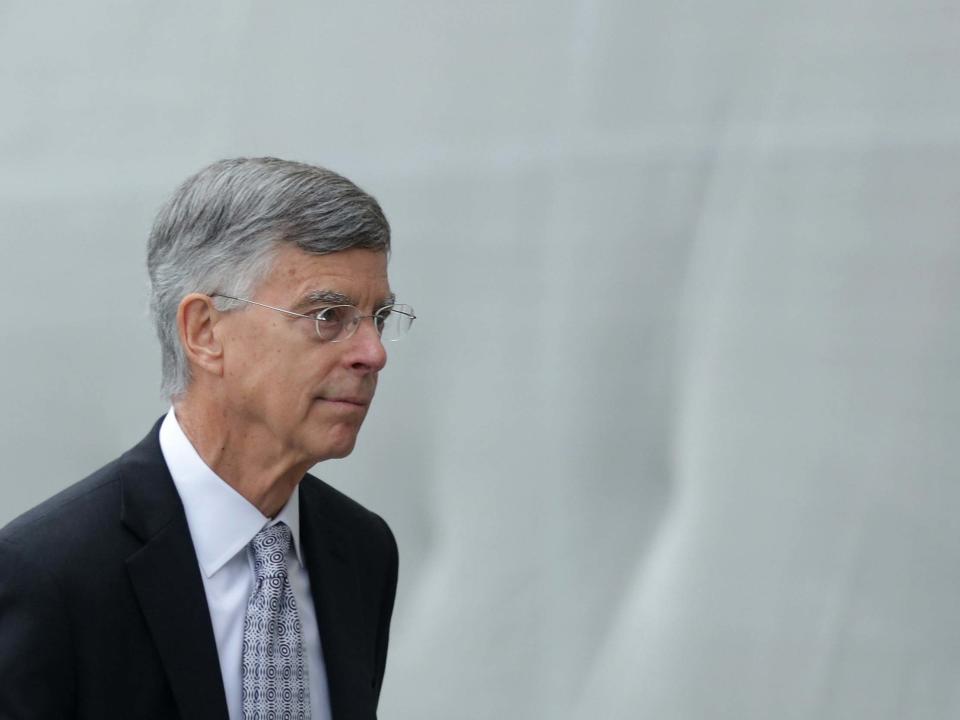Ukraine ambassador says in 'damning' testimony that he was told Trump wanted quid pro quo deal

The US ambassador to Ukraine has told House impeachment investigators that military aid to the former Soviet state was dependent upon a declaration of an investigation into the Bidens, contradicting Donald Trump's claim that no "quid pro quo" deal was arranged.
Ambassador Bill Taylor said during closed-door hearings on Tuesday that he stood by calling it “crazy” to make the military assistance contingent on an investigation into Mr Trump’s political rival Joe Biden and his son Hunter.
Mr Taylor said that after his appointment as ambassador this year he had become alarmed by the existence of a secondary, "irregular" diplomatic channel, and that other US diplomats said they were working to convince Ukrainian president Volodymyr Zelensky to investigate the Bidens.
During a phone call with EU ambassador Gordon Sondland, Mr Taylor said, according to prepared remarks, he was told that the president felt that aid was dependent on a public announcement that Ukraine was opening an investment into Hunter Biden‘s business dealings with Ukrainian oil company Burisma.
“During the phone call, Mr Sondland said that President Trump had told him that he wants President Zelensky to state publicly that Ukraine will investigate Burisma and alleged Ukrainian interference in the 2016 election,” Mr Taylor said in his prepared remarks.
He also told House investigators: “Ambassador Sondland told me that he now recognised that he had made a mistake by earlier telling the Ukrainian officials to whom he spoke that a White house meeting with President Zelensky was dependent on a public announcement of investigations – in fact, Ambassador Sondland said, ‘everything’ was dependent on such an announcement, including security assistance’”.
Mr Taylor the latest official to defy State Department orders not to comply with House Democrats' subpoenas.
“It was just the most damning testimony I’ve heard,” representative Debbie Wasserman Schultz told The Washington Post.
The testimony appeared to confirm claims that Mr Trump had used US money as leverage in order to force the investigation into Hunter Biden, who is the son of former vice president Joe Biden, a key figure who pushed for the removal of a Ukrainian prosecutor. Mr Trump has claimed, contrary to evidence, that Mr Biden had acted on behalf of his son’s interest to get the prosecutor fired, even though the effort was indicative of the Obama administration’s foreign policy and had international consensus.
Mr Trump has denied any clear quid pro quo had occurred during a 25 July phone call with Mr Zelensky, even though a rough transcript released by the White House appears to show Mr Trump pushing for the investigation as a favour to him.
“He drew a very specific direct line from President Trump to the withholding of foreign aid and the refusal of a meeting,” Ms Wasserman Schultz said of Mr Taylor's evidence. It “directly related to both insisting on Zelensky publicly say that he’ll have an investigation, that they will investigate”.
Mr Trump has cast the impeachment investigation as an witch hunt, mirroring language he used to describe the special counsel investigation into Russian meddling, which included potential wrongdoing by the president as well. On the same day as Mr Taylor’s testimony, Mr Trump has received criticism for comparing the impeachment inquiry to a “lynching”.
Democrats have indicated they want to move quickly on impeachment, and have said they could introduce formal charges before the end of the year. That would allow Democrats to put as much distance as possible between the highly polarising measure and the 2020 election campaign.
Read more
Trump met far-right Hungarian leader Orban days before Ukraine meeting
Trump urges Republicans to ‘get tougher’ on impeachment inquiry
Biden staffer ‘turned away’ US official with concerns about Ukraine
Trump’s energy secretary embroiled in Ukraine scandal resigns
